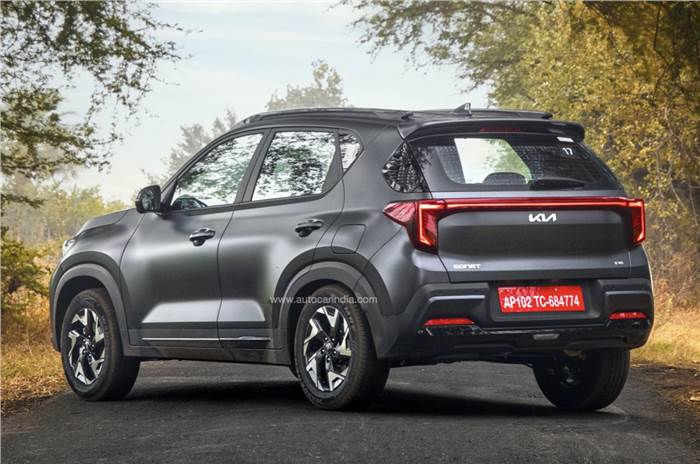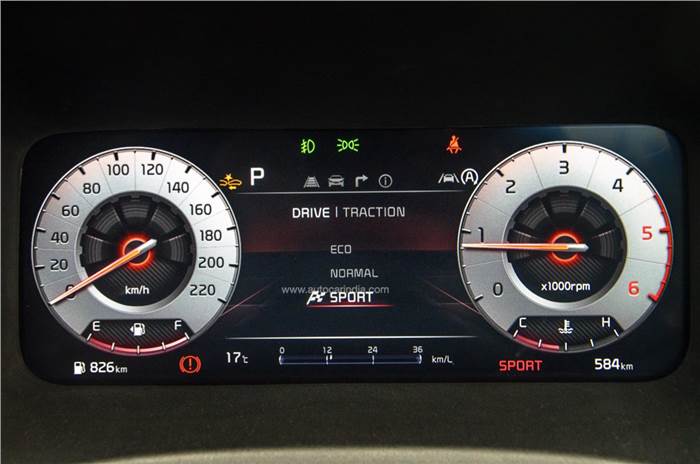2024 Kia Sonet facelift review: Feature perfect
The Sonet set the high-water mark for the segment when it was launched in 2020, so can it do it all over again with the facelift?
Published on Jan 11, 2024 10:00:00 AM
46,353 Views
Follow us on

The Sonet facelift has a decent 385-litre boot.

Sonet gets ADAS features like forward collision warning and braking, lane departure warning, lane keep assist and more.
We Like
- Features list
- Wide range of powertrains
We Don't Like
- Rear seat space
- Lumpy ride
On one hand, the Sonet facelift has the easiest job of them all. When the original was launched, its big draw was its segment-breaking features list, and though some rivals caught up over the years, it always remained near the top. Its other draw was its wide range of ICE powertrains, and that advantage has stayed unchanged. In essence, it remained competitive and didn’t lose too much of its appeal, so there was not much for Kia to do for the facelift.
 Significant change at the rear now aligns the Sonet with the rest of the Kia range.
Significant change at the rear now aligns the Sonet with the rest of the Kia range. On the other hand, how do you improve on a product that got it so right the first time? Well, Kia seems to have found a smidge more proverbial headroom atop its most affordable offering and has nudged it even further into premium territory. So has it worked, or was it perhaps a nudge too far?
2024 Kia Sonet colours, exterior design
Kudos to Kia for going beyond the standard bumper change for this facelift. Though no sheet metal has been reforged, you’ll find a significantly larger grille, new L-shaped headlamps and DRLs, new LED fog lamps (in two styles, depending on the trim) and yes, new bumpers too. There’s only one major change at the rear but it’s arguably more significant, as it aligns the Sonet with the rest of the Kia range. Much like with the Seltos facelift, new vertically oriented LED tail-lamps are joined by an LED light bar, and on the whole the compact SUV has a lot more character now.
| Kia Sonet Price, Mileage, Specifications, Features and Variants | |
|---|---|
| Brand | Kia |
| Model Name | Sonet |
| Kia Sonet Price | ₹ 9.07 - 18.52 lakh |
| Kia Sonet Range/Mileage | Petrol : 18.7 - 19.2kpl | Diesel : 18.6kpl |
| Kia Sonet Specifications | SUV | 5 doors | 5 seats View All Specs |
| Kia Sonet Features | LED headlight | 10.25-inch Touchscreen display | 6 airbags View All Features |
| Kia Sonet Variants | Petrol 1.2 HTE | Petrol 1.2 HTE (O) | Petrol 1.2 HTK View All Variants |
 Facelift gets new L-shaped headlamps and DRLs.
Facelift gets new L-shaped headlamps and DRLs.As before, there’s a bewildering array of lines and trims, starting with the Tech Line and its many variants, the GT Line and then the X Line. Each brings its own set of bumpers and trim-piece colours – the X Line exclusively outfitted in matte grey with gloss black accents, as before – and finally a few alloy wheel options as per the variant. In total, there are 11 colours on offer, including two dual-tone options.
2024 Kia Sonet interior and space
There are also five possible upholstery colours, with Sage Green exclusive to the X Line, black-and-white exclusive to the GT Line, and three different colours depending on which Tech Line variant you pick. Frankly, it’s a lot to wrap your head around, so it’s probably best to pick a variant based on price and features, and hope the colour scheme suits you.
 Cabin is well built and has a contemporary design.
Cabin is well built and has a contemporary design. Whichever you choose, however, what you’ll get is a well-built cabin with a contemporary design. It’s not changed too much, save for new switchgear for the AC controls and the addition of the 10.25-inch full-digital dials screen from the Seltos (more on this later). Shorter passengers might still find the chunky square binnacle around the screens a bit too tall, though.
 Rear window blinds are unique to the segment.
Rear window blinds are unique to the segment.At the rear, you’ll still find segment-unique window blinds and the USB ports are now Type C, but unusually for a facelift, they’ve tried to address the Sonet’s lack of legroom and thigh support by scooping out the front seatbacks, and lowering and lengthening the rear seat squab. There’s a few more millimetres in both cases, but overall, this is still a relatively cramped rear seat. The boot, however, remains decent at 385 litres.
2024 Kia Sonet features and safety
The Sonet’s calling card has always been its features list, and while rivals have caught up in the last four years, they’ve only barely surpassed it. With the Sonet facelift, Kia has well and truly taken back the equipment crown in the segment.
 10.25-inch dials on top trims change appearance depending on the drive mode.
10.25-inch dials on top trims change appearance depending on the drive mode.The 10.25-inch dials on top trims are a proper colour screen with a wealth of information, and change appearance depending on which drive mode you’re in. The 10.25-inch touchscreen adopts the newer OS we first saw in the Carens, too. The vast array of connected features return, both in-car and on your phone, as do ventilated seats, auto climate control, the onboard air purifier, the Bose sound system, and the polarising ‘dancing’ ambient lighting. Apple CarPlay and Android Auto are, sadly, still wired.
 Gets a camera-based ADAS system, unlike the radar-based unit on the Seltos.
Gets a camera-based ADAS system, unlike the radar-based unit on the Seltos.What’s new is a 360-degree camera, 4-way powered driver’s seat, ventilation for the wireless phone charger and ADAS with Level 1 Autonomous driving. Yes, this camera-based system (a step down on the radar-based one found in the Seltos) gets you features like forward collision warning and braking, lane departure warning and lane keep assist, driver attentiveness assist and front vehicle departure alert. It’s part of an extensive safety suite that includes all-around disc brakes, front parking sensors, and standard-issue six airbags, ABS, EBD, TCS, ESC and Hill Assist.
2024 Kia Sonet mileage, engine, gearbox and performance
As before, the Kia Sonet is available with an 83hp, 1.2-litre petrol engine mated to a 5-speed manual gearbox, a 120hp, 1.0-litre turbo-petrol with either a 6-speed iMT (clutchless manual) or a 7-speed dual-clutch auto (DCT), and finally a 115hp, 1.5-litre turbo-diesel with a 6-speed iMT or a 6-speed torque-converter automatic. What’s new is that a conventional three-pedal 6-speed manual also rejoins the diesel engine range, however, today we’re reviewing the automatic versions of the diesel and turbo petrol.

Little has changed on the driving front, and the three-cylinder turbo-petrol still has enough pep to bely its 998cc displacement. The DCT gearbox can be clunky and slow to respond at times, particularly at low revs. However, it makes up for that with quick shifts, and there are paddles too if you want to take full control.
 The short wheelbase and tall suspension make the Sonet facelift feel top heavy.
The short wheelbase and tall suspension make the Sonet facelift feel top heavy.Quite the opposite is the 6-speed automatic that comes with the diesel, which is at its best when driven leisurely. Its shifts are slower but smoother, and once you figure out a nice rhythm, there’s a good amount of performance available. In fact, the diesel automatic remains the powertrain of choice for the Sonet, offering the best blend of performance, refinement and fuel economy. Though we couldn’t do an instrumented test, in our day of mixed city and highway driving, we regularly saw upwards of 10kpl in the turbo petrol, and 15kpl in the diesel.
2024 Kia Sonet comfort and handling
While we’ve addressed the rear seat space already, it has to be said that the seats themselves feel upmarket and sporty, if not outright plush. Ride comfort, however, is not one of this car’s strong points, as before. A combination of firm suspension and a relatively short wheelbase result in a ride that’s lumpy at best and choppy at worst, and sharp potholes register particularly prominently in the cabin.
 Seats feel upmarket, sporty and the driver's seat is 4-way power adjustable.
Seats feel upmarket, sporty and the driver's seat is 4-way power adjustable. Apart from a slightly top-heavy feel, it is at least a tidy handler. No, the steering isn’t anything to write home about, but it’s competent for the class, and body movements are well reined in through fast corners, should you be so inclined. Refinement with both powertrains is really good (unless you really wring them out) and the diesel should get special mention for being among the quietest in this dwindling class.
2024 Kia Sonet price and verdict
If you prioritise features above all else, the Sonet should remain the compact SUV for you, and as such, its proposition on the whole has not changed. As before, it’s a tech fest, and new additions like the 360-degree camera and ADAS features are bound to get people into showrooms. Arguably a bigger draw will be the new looks, which are considerably differentiated from the earlier version, and give the Sonet an edgier and more squared-off look, which is something Indian SUV buyers love.
 New vertically oriented LED tail-lamps are joined by an LED light bar.
New vertically oriented LED tail-lamps are joined by an LED light bar.This is probably the last time SUVs in this segment will have diesel engines, and this one is among the best, especially with regard to smoothness and refinement. Priced from Rs 7.99 lakh to Rs 15.69 lakh (ex-showroom), it spans a wide range, and though expensive at the top end, remains competitive in the context of its multiple powertrains, including the expensive combo of a BS6.2 diesel engine and torque-converter automatic. Rivals will no doubt still fare better in the areas of rear-seat space and ride comfort, but we’ll reserve final judgement for when we do our next comparison test. We’ll also have to wait until then to tell you if this car is once again the segment leader, because all the contenders have gotten hugely competent of late. One thing’s for sure: the Sonet facelift continues to do what it does best; just more of it this time.
Also see:
Kia evaluating hybrids for India
Kia to launch three new cars, SUVs in 2024
Tech Specs 
Copyright (c) Autocar India. All rights reserved.



.jpeg&w=234&h=156&q=90&c=1)




 Engine
Engine Transmission
Transmission Body
Body Suspension
Suspension Brakes
Brakes Dimensions
Dimensions Range
Range
Comments
Member Login
Personal Details
No comments yet. Be the first to comment.